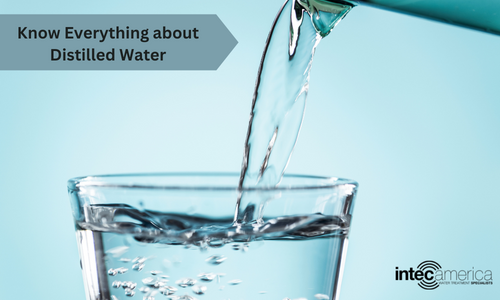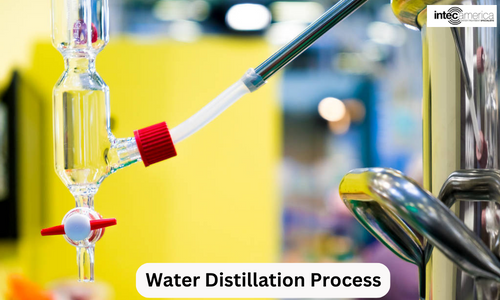Distilled Water: Know Water Distillation Process, Benefits and Usage
Access to clean and potable water is a basic right, and over centuries researchers have experimented with water, its components, and its purification process. Distilled water comprises the actual H2 and O and no other chemicals, bacteria, or metals. It is used across industries as well as in several applications such as batteries, chemical and medical research labs, and more. While distilled water is pure and safe to drink, most people are not used to drinking it. Hence most of them may find it without any flavor and bland. However, today, with much focus on cleanliness and purity, a segment of the global population may prefer to drink it for health and wellness reasons. Whether you’re looking for the purest drinking water or want to know the water distillation process, this post is for you.

What is Distilled Water?
Distilled water is the purest form of water, which is free of chemicals, minerals, impurities, bacteria, and other contaminants. This is why it has been widely used for a variety of applications, such as such as medical and laboratory settings, household appliances, and battery production. The distiller purifies the water by converting it into steam, leaving harmful chemicals, contaminants, and impurities behind. Despite its immense popularity, many of us need clarification about distilled water and the distillation process. The following section explains the water distillation process in detail.
A Step-By-Step Explanation of the Water Distillation Process

The following pointers will help ease your confusion regarding the water distillation process. So, let’s take a look into it.
- Heating: Water is heated in a distillation unit, which typically consists of a boiling chamber and a condenser. Water is heated to its boiling point, which is 100°C (212°F) at sea level.
- Boiling: As the water reaches its boiling point, it begins to vaporize and turn into steam. The steam rises from the boiling chamber and moves into the condenser.
- Cooling: The condenser is designed to cool the steam back into a liquid form. This is typically done using a cooling coil that runs through cold water, which condenses the steam back into pure water.
- Collection: The condensed water is then collected in a separate container designed specifically for this purpose. This container is typically made of glass or a material that is safe for use with potable water.
- Filtration: Some distillation units may also include a filtration step, where the condensed water is filtered through activated carbon or another type of filter to remove any remaining impurities.
- Storage: The distilled water is then stored in a clean container until it is ready to be used.
Benefits of Distilled Water Explained
Distilled water, aside from its industrial and research applications, is said to be beneficial for drinking. As per certain research reports, it may reduce the chances of some health disorders. On the contrary, the water we generally consume has some amount of minerals that are useful for our bodies. Therefore, distilled water may be consumed as long as your body can meet the mineral requirement through other sources. While there is no harm in drinking distilled water, there is much more research required on its health benefits. The following list describes the probable important ones for health and several benefits for non-health applications. So, let’s have a look into it.
- Reduced Risk of Kidney Stones: Some people believe that drinking distilled water can reduce the risk of kidney stones as it does not contain minerals that can contribute to the formation of stones.
- Neutralization of Acid in the Body: Some people believe that distilled water can help neutralize the acid in the body as it does not contain minerals that can contribute to an acidic environment.
- Improved Hydration: Some people believe that drinking distilled water can improve hydration, as it is free of the minerals and impurities that can be found in tap water.
- Purity: Distilled water is virtually pure and free of impurities such as minerals, salts, bacteria, and other contaminants. This makes it ideal for use in a variety of settings, such as medical, laboratory, and industrial, where a pure and consistent product is important and there is zero tolerance for contamination.
- Prevention of Mineral Buildup and Corrosion: Distilled water is used in cooling systems in power plants and other industrial facilities as it helps prevent mineral buildup and corrosion.
- Protecting Household Appliances: The lack of impurities in distilled water can help prevent damage and residue buildup in household appliances such as irons and steam cleaners.
- Improved Battery Performance: Distilled water is often used in the production of batteries as it helps to maintain a pure and consistent product that can improve battery performance.
What is Distilled Water used for?
Distilled water is used in a variety of applications, both industrial and household, due to its high level of purity. Some of the most common uses of distilled water include:
- Medical And Laboratory Settings: Distilled water is often used as a sterile rinse or for mixing medications in medical settings. It is also used in laboratory settings as a control in experiments owing to its high level of purity.
- Household Appliances: Distilled water is commonly used in household appliances such as irons and steam cleaners. This is because the lack of minerals and impurities in this water can help to prevent damage and residue buildup.
- Drinking Water: Some people choose to drink distilled water as a purer form of drinking water compared to tap water, although it is important to note that it does not have the minerals and electrolytes that are found in tap water.
- Battery Production: Distilled water is used in the production of batteries, where a pure and consistent product is important.
- Cooling Systems: Distilled water is used in the cooling systems of power plants and other industrial facilities to prevent mineral buildup and corrosion.
- Personal Care and Cosmetic Products: Distilled water is used in the manufacture of certain cosmetics and personal care products.
- Car Radiators: Distilled water is also used in car radiators to prevent mineral buildup and corrosion, and to help maintain proper engine cooling.
With these posts, you may have gained an understanding of distilled water applications and the water distillation process. Beyond this, if you have any questions, it is best to consult a leading and experienced leader from this industry. Intec America stands tall amongst other its competitors. With vast years of market experience and expertise in water treatment, the company offers safe, reliable, and performance-driven solutions for drinking and usage. The team of experts at Intec America work closely with clients to understand their requirement and assist them in choosing the best possible solutions.
Frequently Asked Questions About Distilled Water
Does distilled water make you thirsty?
Distilled water does not have any taste or minerals, so it may not quench thirst as effectively as water with minerals. However, it does not inherently make you thirsty.
What are the benefits of drinking distilled water?
Drinking distilled water has several potential benefits, such as:
- Removes impurities: Distilled water is free from impurities such as minerals, chemicals, and toxins that may be present in tap water, making it a purer form of water.
- May improve detoxification: As distilled water is free from impurities, it may help in flushing out toxins from the body and improve detoxification.
- May improve hydration: Distilled water is pure water, and as such, it may be absorbed by the body more easily, leading to improved hydration.
- May improve digestion: Drinking distilled water may help improve digestion by reducing the load on the digestive system from impurities in tap water.
- May be beneficial for people with certain medical conditions: Distilled water may be beneficial for people with certain medical conditions, such as kidney disease, as it is free from minerals and other impurities that can be harmful to people with compromised kidney function.
Recent Blog Posts
- Well Water Contamination: Causes, Symptoms and Treatment
- Guide to make rainwater potable
- Know Everything About Rainwater Harvesting
- Microplastics in Drinking Water: Causes and Prevention Overview
- Mercury in Drinking Water – Causes, Effects, and Prevention Explained
- Salt-Free Water Softeners for Residential Water Treatments
- Installation of Whole House Water Filters


